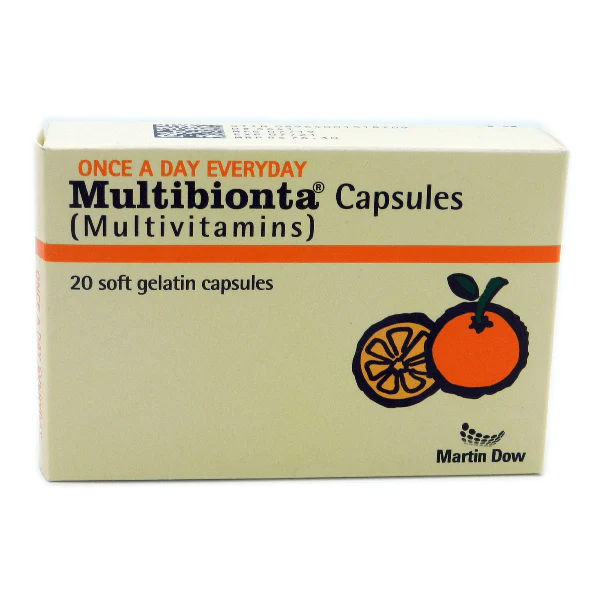
The Truth About Multivitamins: A Look at Their History and Viable Alternatives
By Alexandra Rhodes
A Brief History of Multivitamin Use in America
Multivitamins are pushed by friends, influencers, coworkers, and medical professionals as a viable way to achieve lasting health. However, we are not so sure. In this post, we will take a look at the rising use of synthetic vitamins in America, how it impacts our health, and what alternatives nature can offer.

When Did Research on Synthetic Vitamins Begin?
In 1912, scientist Casimir Funk coined the term "vitamine," inspired by compounds necessary for life. This marked the beginning of synthetic vitamin exploration, though it wasn't until the mid-20th century that synthetic supplements became mainstream in America.
The first multivitamin was introduced in the 1930's by a pharmaceutical company called Miles Laboratories, selling under the brand name Multibionta. Eventually, this company sold itself off the the pharmaceutical giant, Bayer. Well known for experimenting on the Jewish population and contributing to the Nazi efforts during World War II, giving the multivitamin industry one of the darkest histories of all time.
The Truth About Synthetic Supplements
Over the years, research has questioned the efficacy and safety of the synthetic vitamins we find on the shelves. More recently, we have concluded that taking synthetic vitamins too frequently can actually contribute to worse health as oppose to better, as promised by most supplement companies, like Bayer, Ritual, Garden of Life, and Nature Made.
Research like this invites us to take a closer look into what science is promising us, and if it is worth listening to.
American Health Decline Since the Rise of Multivitamins
Synthetic vitamins treat the human body as if it were purely mechanical, but biology is far more complex. One analogy often used is comparing these substances to a key that fits into a door but doesn’t actually turn the lock. Synthetic compounds can mimic natural nutrients but often lack the bioactivity of their naturally occurring counterparts, leaving the body deprived of essential benefits while still interacting with potentially triggering inflammatory responses [source].
This disconnect may partly explain chronic health patterns in America since the widespread adoption of supplements. Over time, inflammation from incompatible substances can result in a wide array of health problems, reflective in modern rates of chronic disease.

A Natural Alternative to Synthetic Vitamins
Unsurprisingly, our most nutrient-abundant sources remain in real food. These sources are also far more bioavailable, meaning the body can more readily absorb and utilize nutrients when derived from whole foods compared to synthetic alternatives [source]. Basically, they can turn the lock.
Organ Meats: Nature’s Multivitamin
Of all the foods we have available to us, the cleanest, most nutrient rich option is organ meats. Typically overlooked in todays western diet, they provide a wide array of nutrients like vitamin A, B vitamins, iron, zinc, selenium, copper, amino acids, and more. Organ meats don't contain just nutrients, they also contain cofactors and enzymes that help amplify nutrient absorption.
As we have explored, nutrient sources, particularly animal nutrient sources are also preferred because even if taken in excess, the body naturally knows how to move them safely through our system. This would be why we could eat the same meal everyday, but never overdose on the nutrients it contains.
Organ Meats Through History
- Ancestral Nutrition: Less than 100 years ago, we ate our organs without protest. Often, we enjoyed them first since they offered the most concentrated nutrients—especially in times when food was scarce.
- "Like for Like" in Ancestral Medicine: Before the birth of western medicine, organ meats were used to treat common ailments. For example, to support natural liver detoxification, we would have eaten liver to support our liver function—a concept validated to some extent by modern enzyme and nutrient science.
Rethinking the Role of Supplements
The history of multivitamin use in America provides a valuable lens through which to analyze broader public health challenges. Instead of attempting to replace the nutrients we find in our food with a synthetic version, we should focus on complimenting our diets with nutrient-rich whole foods or whole food supplements. While not everyone will leap to consuming organ meats immediately, they are a perfectly viable option and yield a higher probability of long-term health success than their synthetic counterparts.

Really, actually holistic.
In the supplement world, you will find things like fillers, binders, and preservatives. This does not exclude supplements labelled as “holistic” and “natural”. We are proud to be one of the first ever companies to produce 100% whole-food vitamins.

The Truth About Multivitamins: A Look at Their History and Viable Alternatives

